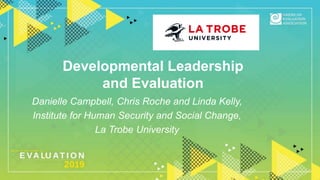Developmental Leadership and Evaluation
- 1. Developmental Leadership and Evaluation Danielle Campbell, Chris Roche and Linda Kelly, Institute for Human Security and Social Change, La Trobe University
- 2. The Warlpiri Education and Training Trust (WETT) WETT wins national Indigenous Governance Award, 2018
- 3. Cynefin Framework Snowden and Boone (2007) ŌĆśA LeaderŌĆÖs Framework for Decision MakingŌĆÖ
- 4. Key Messages - Mixed methods (Mertens and Hesse-Biber 2013; Cowen and Cartwright 2019; Ang 2019) - Feedback loops (Guijt and Roche, 2014; Ramalingam, Wild and Buffardi 2019)
- 5. Generalisable knowledge more valuable & usually created through formal Research or M&E Local, contextual knowledge more valuable & often created through informal exchange of local knowledge Key Messages - Power and politics matter
- 6. M&E Staff Front-line staff, local people Senior Staff Generalised, aggregated succinct knowledge more valued Local, contextual, rich knowledge & feedback more valued And who is caught in the middle?
- 7. Key Messages - Developmental leadership (Hudson, McLoughlin, Roche and Marquette, 2018) - Appropriate governance arrangements (Roche and Denney 2019)
- 8. WETT set-up: 2001-07 WETT Painting by Advisory Committee members: Barbara Napanangka Martin, Nancy Napurrurla Oldfield and Maisie Napaljarri Kitson.
- 9. Context
- 10. WETT M&E 2008-18 - Quantitative data collection - Financial reporting - Capacity measurement - Social return on investment
- 11. 2008-18 M&E - Interviewing - Case studies - Staff reflections - Social network analysis
- 12. 2019 - Developing a WETT M&E Framework Co-facilitators - Marlkirdi Rose and Chris Roche WETT Landowner and Advisory Committee members ŌĆō Oct 2019
- 13. PLUS ŌĆó Strong language and culture ŌĆó Strong young people, families, leaders and communities ŌĆó Respectful relationships with outsiders ŌĆó Self-determination What do WETT committee members want WETT to support?
- 14. Implications - Mixed methods approaches needed but the 'right' data/ methods mix influenced by politics, interests and world- views. - M&E practitioners must manage these different interests. - Developmental leadership may be helpful. - Appropriate M&E governance arrangements needed.















